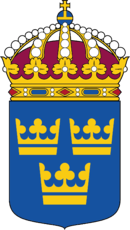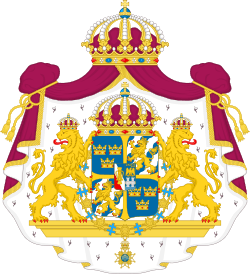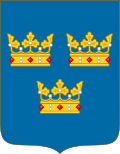Foreign relations of Sweden
 |
| This article is part of a series on the politics and government of Sweden |
|
| Foreign relations |
|
Related topics |
The foreign policy of Sweden is based on the premise that national security is best served by staying free of alliances in peacetime in order to remain a neutral country in the event of war. In 2002, Sweden revised its security doctrine. The security doctrine still states that "Sweden pursues a policy of non-participation in military alliances," but permits cooperation in response to threats against peace and security. The government also seeks to maintain Sweden's high standard of living. These two objectives require heavy expenditures for social welfare, defense spending at rates considered low by Western European standards (currently around 1.2% of GNP[1]), and close attention to foreign trade opportunities and world economic cooperation.
United Nations
Sweden has been a member of the United Nations since 19 November 1946, and participates actively in the activities of the organisation, including as an elected member of the Security Council (1957–1958, 1975–1976 and 1997–1998), providing Dag Hammarskjöld as the second elected Secretary-General of the UN, etc. The strong interest of the Swedish Government and people in international cooperation and peacemaking has been supplemented in the early 1980s by renewed attention to Nordic and European security questions.
European Union
After the then Prime Minister Ingvar Carlsson had submitted Sweden's application in July 1991 the negotiations began in February 1993. Finally, on 1 January 1995, Sweden became a member of the European Union. While some argued that it went against Sweden's historic policy of neutrality, where Sweden had not joined during the Cold War because it was seen as incompatible with neutrality, others viewed the move as a natural extension of the economic cooperation that had been going on since 1972 with the EU. Sweden addressed this controversy by reserving the right not to participate in any future EU defense alliance. In membership negotiations in 1993–1994, Sweden also had reserved the right to make the final decision on whether to join the third stage of the EMU "in light of continued developments." In a nationwide referendum in November 1994, 52.3 percent of participants voted in favour of EU membership. Voter turnout was high, 83.3 percent of the eligible voters voted. The main Swedish concerns included winning popular support for EU cooperation, EU enlargement, and strengthening the EU in areas such as economic growth, job promotion, and environmental issues.
In polls taken a few years after the referendum, many Swedes indicated that they were unhappy with Sweden's membership in the EU. However, after Sweden successfully hosted its first presidency of the EU in the first half of 2001, most Swedes today have a more positive attitude towards the EU. The government, with the support of the Center Party, decided in spring 1997 to remain outside of the EMU, at least until 2002. A referendum was held on 14 September 2003. The results were 55.9% for no, 42.0% yes and 2.1% giving no answer ("blank vote").
Nordic Council
Swedish foreign policy has been the result of a wide consensus. Sweden cooperates closely with its Nordic neighbors, formally in economic and social matters through the Nordic Council of Ministers and informally in political matters through direct consultation.
Nonalignment
Swedish neutrality and nonalignment policy in peacetime may partly explain how the country could stay out of wars since 1814. Swedish governments have not defined nonalignment as precluding outspoken positions in international affairs. Government leaders have favored national liberation movements that enjoy broad support among developing world countries, with notable attention to Africa. During the Cold War, Sweden was suspicious of the superpowers, which it saw as making decisions affecting small countries without always consulting those countries. With the end of the Cold War, that suspicion has lessened somewhat, although Sweden still chooses to remain nonaligned. Sweden has devoted particular attention to issues of disarmament, arms control, and nuclear nonproliferation and has contributed importantly to UN and other international peacekeeping efforts, including the NATO-led peacekeeping forces in the Balkans. It sat as an observer in the Western European Union from 1995 to 2011, but it is not an active member of NATO's Partnership for Peace and the Euro-Atlantic Partnership Council.
Sweden's engagement with NATO was especially strengthened during the term of Anders Fogh Rasmussen.[2]
Sweden's nonalignment policy has led it to serve as the protecting power for a number of nations who don't have formal diplomatic relations with each other for various reasons. It currently represents the United States, Canada, and several Western European nations in North Korea for consular matters. On several occasions when the United Kingdom broke off relations with Iran (including the 1979 Iranian Revolution, the Salman Rushdie affair, and the 2012 storming of the British embassy in Tehran), Sweden served as the protecting power for the UK.
Participation in international organizations
Europe
| Country | Formal relations began | Notes |
|---|---|---|
| 1992 |
In 2012, both nations severed diplomatic relations and closed their diplomatic missions in each nations capitals, respectively, because of Sweden's criticism of Belarus' human rights record.[3]
| |
| 1914-07-06 |
| |
| ||
| See Denmark–Sweden relations.
Today, both countries are separated by the Øresund, which links the Baltic Sea and the North Sea. Both countries are full members of the Council of the Baltic Sea States, of the Council of Europe, and of the European Union. There are around 21,000 Swedish people living in Denmark and there are around 42,000 Danish people living in Sweden.
| ||
| See Estonia–Sweden relations.
Estonia was under Swedish occupation between 1561 and 1721. Sweden re-recognized Estonia on August 27, 1991. Estonia has an embassy in Stockholm and 5 honorary consulates (in Eskilstuna, Gothenburg, Karlskrona, Malmö and Visby). Sweden has an embassy in Tallinn and 2 honorary consulates (in Narva and Tartu). | ||
| See Finland–Sweden relations.
Finnish–Swedish relations have a long history (Sweden and Finland was the same country for several hundred years), due to the close relationship between Finland and Sweden. Particularly in Finland, the issue emerges in frequent exposés of Finnish history, and in motives for governmental proposals and actions as reported in Finnish news broadcasts in English or other foreign languages. In Sweden, this relationship is a recurrent important theme of 20th-century history, although maybe by most Swedes considered to be an issue of purely historical relevance now that both countries have been members of the European Union since 1995. | ||
| See Germany–Sweden relations. | ||
| See Greece–Sweden relations. | ||
| See Hungary–Sweden relations.
Sweden has an embassy in Budapest. Diplomacy relations between the two countries started on December 28, 1945. These relations developed to a higher ambassador level. In Stockholm there is a Hungarian embassy. | ||
| See Ireland–Sweden relations.
Ireland has an embassy in Stockholm.[12] Sweden closed its embassy in Dublin in September 2010, but has four honorary consulates (in Dublin, Cork, Galway and Limerick).[13] Both countries are full members of Council of Europe and of the European Union. Speaker of the Riksdag Per Westerberg visited Dublin on 26 June 2009, just a few days before the start of the Swedish Presidency of the European Union.[14] On 17 July 2009, the Swedish Trade Council closed their office in Dublin, and Irish operations were moved to their UK office.[14][15] | ||
| See Kosovo–Sweden relations.
Sweden recognized Kosovo on 4 March 2008.[16] Liaison Office of Sweden in Pristina, subordinated to the Embassy in Skopje, Macedonia.[17] On 8 March 2008, the Swedish Minister for Foreign Affairs Carl Bildt became the first foreign minister to officially visit Kosovo since it declared its independence.[18] Sweden currently has 243 troops serving in Kosovo as peacekeepers in the NATO led Kosovo Force.[19] | ||
| See Lithuania–Sweden relations. | ||
| See Moldova–Sweden relations.
Moldova has an embassy in Stockholm. Sweden has an embassy in Chişinău. Sweden is one of Moldova's top donors. From 1996, Sweden provided Moldova with technical assistance worth 30 million dollars, which significantly helped strengthen sectors such as: protection of human rights, democracy, good governance, public health, education, agriculture, energy, infrastructure, transport and the private sector. Much of the aid is delivered through the Swedish International Development Agency.[20][21] In 2007, the Swedish Government established the 2007-2010 strategy of cooperation with Moldova, which sees 11 million euros in financial assistance annually for three important sectors: good governance, strengthening of com petitiveness in the rural area and reduction of vulnerability in the energy sector.[20] | ||
| See Norway–Sweden relations. | ||
| 1916-11-1 | See Romania–Sweden relations.
Romania has an embassy in Stockholm and an honorary consulate in Gothenburg.[24] Sweden has an embassy in Bucharest and an honorary consulate in Timişoara.[25] In 2009 Romanian Radio Broadcasting Company was nominated for the Astrid Lindgren Memorial Award.[26] | |
| See Russia–Sweden relations.
Both countries had a history of war, and reastablishing diplomatic missions. Russia has an embassy in Stockholm and a consulate in Gothenburg, and Sweden has an embassy in Moscow and consulates in Saint Petersburg and Kaliningrad. | ||
| See Serbia–Sweden relations.
Serbia has an embassy in Stockholm. Sweden has an embassy in Belgrade.[27] | ||
| See Sweden–Turkey relations.
Both countries are full members of the Council of Europe, the Organisation for Economic Co-operation and Development (OECD), the Organization for Security and Co-operation in Europe (OSCE) and the Union for the Mediterranean. Sweden, which will take over the rotating presidency of the Presidency of the Council of the European Union in July 2009, supports Turkey's European Union membership.[28][29] Sweden's Green Party has criticized France and Germany's opposition to Turkey's membership.[30][31] | ||
| See Sweden–Ukraine relations.
A Ukrainian information bureau was opened 1916 in Stockholm by Volodymyr Stepankivskyi and M. Zaliznyak. In 1918 an official diplomatic mission from the Ukrainian People's Republic headed by K. Lossky was opened in Stockholm.[32] Diplomatic relations between Ukraine and Sweden were established on January 13, 1992. Sweden has an embassy in Kiev and an honorary consulate in Kakhovka. Ukraine has an embassy in Stockholm. | ||
See Foreign relations of the United Kingdom.
| ||
Rest of world
| Country | Formal relations began | Notes |
|---|---|---|
See Foreign relations of Armenia.
| ||
| See Australia–Sweden relations. | ||
| See Canada–Sweden relations.
See also: Swedish Canadian
Relations with Canada are close, positive and constructive. Both countries have strong commitments to peacekeeping, UN reform, development assistance, environmental protection, sustainable development, and the promotion and protection of human rights.[38] In additional, there are more than 300,000 Canadians of Swedish descent.[39] Canada has an embassy in Stockholm and two consulates in Gothenburg and Malmö. Sweden has an embassy in Ottawa and ten consulates in Calgary, Edmonton, Fredericton, Halifax, Montreal, Quebec City, Regina, Toronto, Vancouver and Winnipeg. | ||
| 11 December 1874 |
The relationship between Colombia and Sweden has been continuous and close, with Sweden maintaining a close cooperation with the South American country.[40] | |
| See Guinea-Bissau–Sweden relations.
Sweden established official diplomatic relations with Guinea-Bissau in 1974, the same year Guinea-Bissau formally gained independence from Portugal.[41] | ||
| See Iran–Sweden relations. | ||
| See Iraq–Sweden relations.
Iraq has an embassy in Stockholm and Sweden has an embassy in Baghdad.[42] Sweden is one of the largest donors to the protection force for UN personnel in Iraq, that was established in 2004. | ||
| See Israel–Sweden relations.
Both countries established diplomatic relations in 1949. Israel has an embassy in Stockholm.[43] Sweden has an embassy in Tel Aviv.[44] | ||
| See Malaysia–Sweden relations.
Diplomatic relations were established in 1958.[45] Sweden has an embassy in Kuala Lumpur, and Malaysia has an embassy in Stockholm. As of 2009, 90 Swedish companies are present in Malaysia and about 450 Swedish citizens live in Malaysia. | ||
| 29 July 1885 | See Mexico–Sweden relations.
| |
| See Foreign relations of North Korea | ||
| 11 March 1959[48] | See Sweden–South Korea relations
| |
| See Sweden–United States relations.
Sweden and the United States have had strong ties since the 18th century.
|
See also
- Politics of Sweden
- List of diplomatic missions in Sweden
- List of diplomatic missions of Sweden
- List of state visits made by King Carl XVI Gustaf of Sweden
- Scandinavian defense union
- Visa requirements for Swedish citizens
- Arctic policy of Sweden
- List of ambassadors of Sweden to Ukraine
References
- ↑ WorldBank. "Military expenditure (% of GDP)". report. Retrieved 5 October 2015.
- ↑ NATO Review. "Sweden: a special NATO partner?". NATO Review. Retrieved 20 February 2015.
- ↑ The Guardian: Belarus orders Sweden to close its Minsk embassy
- ↑ Bulgarian embassy in Stockholm
- ↑ "Sweden Abroad". Retrieved 20 February 2015.
- ↑ Embassy of Denmark in Stockholm (in Danish and English)
- ↑ Embassy of Sweden in Copenhagen (in English and Swedish)
- ↑ Embassy of Finland in Stockholm (in Finnish and Swedish)
- ↑ Embassy of Sweden in Helsinki (in Finnish and Swedish)
- ↑ Embassy of Iceland in Stockholm (in English, Icelandic and Swedish)
- ↑ Embassy of Sweden in Reykjavik (in English, Icelandic and Swedish)
- ↑ "Department of Foreign Affairs". Retrieved 20 February 2015.
- ↑ "Sweden Abroad". Retrieved 20 February 2015.
- 1 2 "The Speaker of the Swedish Parliament visits Dublin". Sweden. Retrieved 2009-06-28.
- ↑ "Exportrådet i Irland" (in Swedish). Sweden. Archived from the original on March 26, 2009. Retrieved 2009-06-28.
- ↑ "Sweden recognises the Republic of Kosovo" (Press release). Swedish Ministry for Foreign Affairs. 2008-03-04. Retrieved 2008-03-04.
- ↑ Liaison Office of Sweden in Pristina, Ministry for Foreign Affairs.
- ↑ Minister for Foreign Affairs Carl Bildt to visit Kosovo and Macedonia, Ministry for Foreign Affairs, 6 March 2008.
- ↑ "Kosovo Force (KFOR)" nato.int Link accessed 21-07-09.
- 1 2 http://www.moldpres.md/default.asp?Lang=en&ID=63135
- ↑ http://www.moldpres.md/default.asp?Lang=en&ID=77702
- ↑ Embassy of Norway in Stockholm (in Norwegian and Swedish)
- ↑ Embassy of Sweden in Oslo (in Norwegian and Swedish)
- ↑ "AMBASADA ROMÂNIEI în Regatul Suediei". Retrieved 20 February 2015.
- ↑ "Bucharest - SwedenAbroad". Retrieved 20 February 2015.
- ↑ "Radio Romania has been nominated as a candidate to the Astrid Lindgren memorial award (ALMA).". Sweden. Retrieved 2009-06-28.
- ↑ "Belgrade - SwedenAbroad". Retrieved 20 February 2015.
- ↑ "Turkey Has Friends in EU, Swedish Prime Minister Fredrik Reinfeldt". Turkish Weekly. 21 April 2009. Retrieved 2009-05-22.
- ↑ "EU'S UPCOMING PRESIDENT EXTENDS FULL SUPPORT FOR TURKEY'S MEMBERSHIP". TurkNet. 08/05/2009. Retrieved 2009-05-22. Check date values in:
|date=(help) - ↑ "Sweden's Greens: Opposition to Turkey due to Islamophobia". Today's Zaman. 11 May 2009. Archived from the original on May 28, 2009. Retrieved 2009-05-22.
- ↑ "German, French Leaders Oppose Turkey Joining EU". The Wall Street Journal. Archived from the original on May 14, 2009. Retrieved 2009-05-22.
- ↑ "Посольство України в Королівстві Швеція". Retrieved 20 February 2015.
- ↑ "Storbritannien och Nordirland". Retrieved 20 February 2015.
- ↑ "Worldwide organisations". Retrieved 20 February 2015.
- ↑ "British Embassy Stockholm - GOV.UK". Retrieved 20 February 2015.
- ↑ "Felsida". Retrieved 20 February 2015.
- ↑
- ↑ Canada-Sweden Relations
- ↑ "Ethnocultural Portrait of Canada - Data table". 2 April 2008. Retrieved 20 February 2015.
- ↑ "- Cancillería". Cancillería. Retrieved 20 February 2015.
- ↑ Sellström, Tor. Sweden and National Liberation in Southern Africa. Uppsala: Nordiska Afrikainstitutet, 1999. pp. 69–70.
- ↑ Swedish embassy in Baghdad.
- ↑ "Israels ambassad i Sverige". Retrieved 20 February 2015.
- ↑ "Tel Aviv - SwedenAbroad". Retrieved 20 February 2015.
- ↑ "National Day Of Sweden Celebrations In Malaysia". Scandasia.com. Retrieved 2009-06-05.
6 June 2008 does not only represent the National Day of Sweden, but also marks 50 years of diplomatic relations between Sweden and Malaysia. ...
- ↑ Embassy of Mexico in Stockholm (in English and Spanish)
- ↑ Embassy of Sweden in Mexico City (in Spanish and Swedish)
- 1 2 http://www.mofa.go.kr/ENG/countries/europe/countries/20070823/1_24594.jsp?menu=m_30_40
- ↑ http://swe.mofa.go.kr/english/eu/swe/main/index.jsp
- ↑ http://www.swedenabroad.com/sv-SE/Ambassader/Seoul/
- ↑ Embassy of Sweden in Washington, DC (in English and Swedish)
- ↑ Embassy of the United States in Stockholm
Further reading
- Horn, David Bayne. Great Britain and Europe in the eighteenth century (1967) covers 1603-1702; pp 236-69.
- Lindström, Peter, and Svante Norrhem. Flattering Alliances: Scandinavia, Diplomacy and the Austrian-French Balance of Power, 1648-1740 (Nordic Academic Press, 2013).
- Salmon, Patrick. Scandinavia and the great powers 1890-1940 (Cambridge University Press, 2002).
External links
Further reading
- "Sweden and Africa — a policy to address common challenges and opportunities" White paper delivered by the Minister of Foreign Affairs to the Riksdag 6 March 2008

